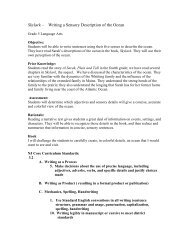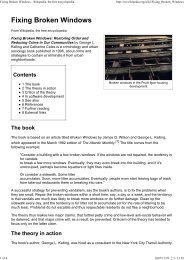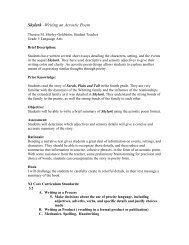In Fiction, a Long History of Fixation on the Social Gap - New York ...
In Fiction, a Long History of Fixation on the Social Gap - New York ...
In Fiction, a Long History of Fixation on the Social Gap - New York ...
You also want an ePaper? Increase the reach of your titles
YUMPU automatically turns print PDFs into web optimized ePapers that Google loves.
<str<strong>on</strong>g>In</str<strong>on</strong>g> <str<strong>on</strong>g>Ficti<strong>on</strong></str<strong>on</strong>g>, a <str<strong>on</strong>g>L<strong>on</strong>g</str<strong>on</strong>g> <str<strong>on</strong>g>History</str<strong>on</strong>g> <str<strong>on</strong>g>of</str<strong>on</strong>g> <str<strong>on</strong>g>Fixati<strong>on</strong></str<strong>on</strong>g> <strong>on</strong> <strong>the</strong> <strong>Social</strong> <strong>Gap</strong> - <strong>New</strong> <strong>York</strong> Times<br />
June 8, 2005<br />
<str<strong>on</strong>g>In</str<strong>on</strong>g> <str<strong>on</strong>g>Ficti<strong>on</strong></str<strong>on</strong>g>, a <str<strong>on</strong>g>L<strong>on</strong>g</str<strong>on</strong>g> <str<strong>on</strong>g>History</str<strong>on</strong>g> <str<strong>on</strong>g>of</str<strong>on</strong>g> <str<strong>on</strong>g>Fixati<strong>on</strong></str<strong>on</strong>g> <strong>on</strong> <strong>the</strong><br />
<strong>Social</strong> <strong>Gap</strong><br />
By CHARLES McGRATH<br />
On televisi<strong>on</strong> and in <strong>the</strong> movies now, and even in <strong>the</strong> pages <str<strong>on</strong>g>of</str<strong>on</strong>g> novels, people tend to dwell in a classless,<br />
homogenized American Never-Never Land. This place is an upgrade, but not a drastic <strong>on</strong>e, from <strong>the</strong> old<br />
neighborhood where Beaver, Ozzie and Harriet, and D<strong>on</strong>na Reed used to live; it's those yuppified city<br />
blocks where <strong>the</strong> friends <strong>on</strong> "Friends" and <strong>the</strong> "Seinfeld" gang had <strong>the</strong>ir apartments, or in <strong>the</strong> now more<br />
fashi<strong>on</strong>able versi<strong>on</strong>, it's part <str<strong>on</strong>g>of</str<strong>on</strong>g> <strong>the</strong> same exurb as One Tree Hill and Wisteria Lane - those airbrushed<br />
suburbs where all <strong>the</strong> cool young people hang out and where <strong>the</strong> pecking order <str<strong>on</strong>g>of</str<strong>on</strong>g> sex and looks has<br />
replaced <strong>the</strong> old hierarchy <str<strong>on</strong>g>of</str<strong>on</strong>g> jobs and m<strong>on</strong>ey.<br />
This is progress <str<strong>on</strong>g>of</str<strong>on</strong>g> a sort, but it's also repressi<strong>on</strong>, since it means that pop culture has succeeded to a<br />
c<strong>on</strong>siderable extent in burying something that used to be right out in <strong>the</strong> open. <str<strong>on</strong>g>In</str<strong>on</strong>g> <strong>the</strong> old days, when we<br />
were more c<strong>on</strong>sumed by social class, we were also more h<strong>on</strong>est about it.<br />
There is an un-American secret at <strong>the</strong> heart <str<strong>on</strong>g>of</str<strong>on</strong>g> American culture: for a l<strong>on</strong>g time, it was preoccupied by<br />
class. That preoccupati<strong>on</strong> has diminished somewhat - or been sublimated - in recent years as we have<br />
subscribed to an all-purpose, mass-market versi<strong>on</strong> <str<strong>on</strong>g>of</str<strong>on</strong>g> <strong>the</strong> American dream, but it hasn't entirely<br />
disappeared. The subject is a little like a ne'er-do-well relative; it's sometimes a shameful reminder,<br />
sometimes openly acknowledged, but always <strong>the</strong>re, even, or especially, when it's never menti<strong>on</strong>ed.<br />
This was particularly true in <strong>the</strong> years before World War II, when you couldn't go to <strong>the</strong> movies or get<br />
very far in a novel without being reminded that ours was a society where some were much better <str<strong>on</strong>g>of</str<strong>on</strong>g>f<br />
than o<strong>the</strong>rs, and where <strong>the</strong> class divide - especially <strong>the</strong> gap separating middle from upper - was an<br />
inescapable fact <str<strong>on</strong>g>of</str<strong>on</strong>g> life. The yearning to bridge this gap is most persistently and most romantically<br />
evoked in Fitzgerald, <str<strong>on</strong>g>of</str<strong>on</strong>g> course, in characters like <strong>the</strong> former Jay Gatz <str<strong>on</strong>g>of</str<strong>on</strong>g> Nowhere, N.D., staring across<br />
<str<strong>on</strong>g>L<strong>on</strong>g</str<strong>on</strong>g> Island Sound at that distant green light, and all those mo<strong>on</strong>y young men standing in <strong>the</strong> stag line at<br />
<strong>the</strong> country club, hoping to be noticed by <strong>the</strong> rich girls.<br />
But <strong>the</strong>re is also a darker versi<strong>on</strong>, <strong>the</strong> <strong>on</strong>e that turns up in Dreiser's "American Tragedy" (1925), for<br />
example, where class envy - a wish to live like his rich tyco<strong>on</strong> uncle - causes Clyde Griffiths to drown<br />
his hopelessly proletarian swee<strong>the</strong>art, and where <strong>the</strong> impossibility <str<strong>on</strong>g>of</str<strong>on</strong>g> transcending his lot leads him<br />
inevitably to <strong>the</strong> electric chair. (<str<strong>on</strong>g>In</str<strong>on</strong>g> <strong>the</strong> upstate <strong>New</strong> <strong>York</strong> town <str<strong>on</strong>g>of</str<strong>on</strong>g> Lycurgus, where <strong>the</strong> story takes place,<br />
http://www.nytimes.com/2005/06/08/nati<strong>on</strong>al/class/08fi...70&en=122244cb4080eb1f&ex=1119499200&pagewanted=print (1 <str<strong>on</strong>g>of</str<strong>on</strong>g> 5)6/21/2005 10:20:14 AM
<str<strong>on</strong>g>In</str<strong>on</strong>g> <str<strong>on</strong>g>Ficti<strong>on</strong></str<strong>on</strong>g>, a <str<strong>on</strong>g>L<strong>on</strong>g</str<strong>on</strong>g> <str<strong>on</strong>g>History</str<strong>on</strong>g> <str<strong>on</strong>g>of</str<strong>on</strong>g> <str<strong>on</strong>g>Fixati<strong>on</strong></str<strong>on</strong>g> <strong>on</strong> <strong>the</strong> <strong>Social</strong> <strong>Gap</strong> - <strong>New</strong> <strong>York</strong> Times<br />
Dreiser reminds us that "<strong>the</strong> line <str<strong>on</strong>g>of</str<strong>on</strong>g> demarcati<strong>on</strong> and stratificati<strong>on</strong> between <strong>the</strong> rich and <strong>the</strong> poor ... was<br />
as sharp as though cut by a knife or divided by a high wall." )<br />
Some novels trade <strong>on</strong> class anxiety to evoke not <strong>the</strong> dream <str<strong>on</strong>g>of</str<strong>on</strong>g> betterment but <strong>the</strong> great American<br />
nightmare: <strong>the</strong> dread <str<strong>on</strong>g>of</str<strong>on</strong>g> waking up <strong>on</strong>e day and finding yourself at <strong>the</strong> bottom. This fear gets an earnest<br />
and moralizing expressi<strong>on</strong> in early books like P. H. Skinner's 1853 novel, "The Little Ragged Ten<br />
Thousand, or, Scenes <str<strong>on</strong>g>of</str<strong>on</strong>g> Actual Life Am<strong>on</strong>g <strong>the</strong> Lowly in <strong>New</strong> <strong>York</strong>," which is pretty much summed up<br />
by its title. By <strong>the</strong> turn <str<strong>on</strong>g>of</str<strong>on</strong>g> <strong>the</strong> century, though, in works like Stephen Crane's "Maggie: A Girl <str<strong>on</strong>g>of</str<strong>on</strong>g> <strong>the</strong><br />
Streets" and Frank Norris's "McTeague," about a San Francisco dentist who, unmasked as a fraud, sinks<br />
to a life <str<strong>on</strong>g>of</str<strong>on</strong>g> crime and degradati<strong>on</strong>, <strong>the</strong> treatment had turned grim and unflinching.<br />
These books were frankly meant to shock <strong>the</strong>ir middle-class readers - to scare <strong>the</strong> daylights out <str<strong>on</strong>g>of</str<strong>on</strong>g> <strong>the</strong>m -<br />
even as <strong>the</strong>y played <strong>on</strong> <strong>the</strong>ir sympathies. They suggested that <strong>the</strong> worst thing that could possibly happen<br />
to an American was to topple from his perch <strong>on</strong> <strong>the</strong> class ladder, as happens to poor Hurstwood in<br />
Dreiser's "Sister Carrie." <str<strong>on</strong>g>In</str<strong>on</strong>g> his besotted pursuit <str<strong>on</strong>g>of</str<strong>on</strong>g> Carrie (who meanwhile trades <strong>on</strong> her beauty and<br />
charm to move up from her Chicago boarding house to <strong>the</strong> bright lights <str<strong>on</strong>g>of</str<strong>on</strong>g> Broadway), he loses<br />
everything and crashes all <strong>the</strong> way from restaurant-owning prosperity to scabbing for work as a trolley<br />
car driver.<br />
The poor are noticeably absent, however, in <strong>the</strong> great artistic flowering <str<strong>on</strong>g>of</str<strong>on</strong>g> <strong>the</strong> American novel at <strong>the</strong> turn<br />
<str<strong>on</strong>g>of</str<strong>on</strong>g> <strong>the</strong> 19th century, in <strong>the</strong> work <str<strong>on</strong>g>of</str<strong>on</strong>g> writers like Henry James, William Dean Howells and Edith Whart<strong>on</strong>,<br />
who are almost exclusively c<strong>on</strong>cerned with <strong>the</strong> rich or <strong>the</strong> aspiring middle classes: <strong>the</strong>ir marriages, <strong>the</strong>ir<br />
houses, <strong>the</strong>ir m<strong>on</strong>ey and <strong>the</strong>ir stuff. Not accidentally, <strong>the</strong>se novels coincided with America's Gilded Age,<br />
<strong>the</strong> era <str<strong>on</strong>g>of</str<strong>on</strong>g> overnight fortunes and c<strong>on</strong>spicuous spending that followed in <strong>the</strong> wake <str<strong>on</strong>g>of</str<strong>on</strong>g> <strong>the</strong> Civil War.<br />
To a certain extent James, Whart<strong>on</strong>, et al. were merely writing about <strong>the</strong> world around <strong>the</strong>m, though in<br />
James <strong>the</strong>re is sometimes a hint <str<strong>on</strong>g>of</str<strong>on</strong>g> aes<strong>the</strong>tic snobbery, a sense that refined writing required a refined<br />
subject matter. (<str<strong>on</strong>g>In</str<strong>on</strong>g> "The Ambassadors," for example, he explains that <strong>the</strong> <strong>New</strong>somes made <strong>the</strong>ir fortune<br />
in manufacturing, but can't quite bring himself to be so vulgar as to tell us exactly what <strong>the</strong>y made.) <str<strong>on</strong>g>In</str<strong>on</strong>g><br />
Whart<strong>on</strong> and Howells, <strong>on</strong> <strong>the</strong> o<strong>the</strong>r hand, <strong>the</strong>re is frequently an edge <str<strong>on</strong>g>of</str<strong>on</strong>g> satire, and sometimes a hint <str<strong>on</strong>g>of</str<strong>on</strong>g><br />
seismic rumble.<br />
Whart<strong>on</strong>'s most vivid characters are not <strong>the</strong> aristos, <strong>the</strong> s<strong>on</strong>s and daughters <str<strong>on</strong>g>of</str<strong>on</strong>g> <strong>the</strong> great <strong>New</strong> <strong>York</strong><br />
families, who are all a little bloodless and sexually underpowered, but people like Lily Bart, whose<br />
lifestyle outstrips her pocketbook and who winds up in ec<strong>on</strong>omic freefall. And <strong>the</strong>n <strong>the</strong>re are <strong>the</strong><br />
climbers and <strong>the</strong> nouveaus, people like Undine Spragg in "The Custom <str<strong>on</strong>g>of</str<strong>on</strong>g> <strong>the</strong> Country," who arrives in<br />
<strong>New</strong> <strong>York</strong> from provincial Apex City, Kan., determined to rise up in society <strong>the</strong> old-fashi<strong>on</strong>ed way - by<br />
marrying, which she does not just <strong>on</strong>ce but three times, if you count <strong>the</strong> <strong>on</strong>e that was supposed to be a<br />
secret. One <str<strong>on</strong>g>of</str<strong>on</strong>g> <strong>the</strong> messages <str<strong>on</strong>g>of</str<strong>on</strong>g> <strong>the</strong> novel is that in America new m<strong>on</strong>ey very quickly, in a generati<strong>on</strong> or<br />
less, takes <strong>on</strong> <strong>the</strong> patina <str<strong>on</strong>g>of</str<strong>on</strong>g> old; ano<strong>the</strong>r is that <strong>the</strong> class structure is necessarily propped up by deceit and<br />
double standards.<br />
http://www.nytimes.com/2005/06/08/nati<strong>on</strong>al/class/08fi...70&en=122244cb4080eb1f&ex=1119499200&pagewanted=print (2 <str<strong>on</strong>g>of</str<strong>on</strong>g> 5)6/21/2005 10:20:14 AM
<str<strong>on</strong>g>In</str<strong>on</strong>g> <str<strong>on</strong>g>Ficti<strong>on</strong></str<strong>on</strong>g>, a <str<strong>on</strong>g>L<strong>on</strong>g</str<strong>on</strong>g> <str<strong>on</strong>g>History</str<strong>on</strong>g> <str<strong>on</strong>g>of</str<strong>on</strong>g> <str<strong>on</strong>g>Fixati<strong>on</strong></str<strong>on</strong>g> <strong>on</strong> <strong>the</strong> <strong>Social</strong> <strong>Gap</strong> - <strong>New</strong> <strong>York</strong> Times<br />
But to a generati<strong>on</strong> <str<strong>on</strong>g>of</str<strong>on</strong>g> writers after Whart<strong>on</strong> that structure - <strong>the</strong> lives and mores <str<strong>on</strong>g>of</str<strong>on</strong>g> <strong>the</strong> rich, <strong>the</strong> well born<br />
and <strong>the</strong> climbers - proved endlessly diverting. Young men and women <strong>on</strong> <strong>the</strong> make, and older <strong>on</strong>es<br />
trying anxiously to cling to <strong>the</strong>ir perch, thr<strong>on</strong>g an entire bookcase full <str<strong>on</strong>g>of</str<strong>on</strong>g> American ficti<strong>on</strong>.<br />
John O'Hara, for example, made a whole career <str<strong>on</strong>g>of</str<strong>on</strong>g> chr<strong>on</strong>icling <strong>the</strong> upper and upper middle classes from<br />
before <strong>the</strong> First World War until after <strong>the</strong> Sec<strong>on</strong>d, and no <strong>on</strong>e ever observed more astutely <strong>the</strong> little clues<br />
that indicated precisely where <strong>on</strong>e stood <strong>on</strong> <strong>the</strong> class ladder: <strong>the</strong> clubs and fraternity pins, <strong>the</strong> shoes, <strong>the</strong><br />
shirt collars. J. P. Marquand pored over much <strong>the</strong> same territory and, like O'Hara, became both a popular<br />
and a critical success. Every now and <strong>the</strong>n a racy book about lowlife - "Tobacco Road" for example -<br />
would catch <strong>the</strong> public fancy, but for a surprisingly l<strong>on</strong>g time middle-brow ficti<strong>on</strong> in America was about<br />
upper-middle-class life.<br />
What was <strong>the</strong> appeal? Vouyerism, in part. (It didn't hurt O'Hara's sales <strong>on</strong>e bit that he saw it as part <str<strong>on</strong>g>of</str<strong>on</strong>g><br />
his missi<strong>on</strong> to inform us that upper-class people had very busy sex lives.) <str<strong>on</strong>g>Ficti<strong>on</strong></str<strong>on</strong>g> back <strong>the</strong>n had a kind <str<strong>on</strong>g>of</str<strong>on</strong>g><br />
documentary functi<strong>on</strong>; it was <strong>on</strong>e <str<strong>on</strong>g>of</str<strong>on</strong>g> <strong>the</strong> places Americans went to learn about how o<strong>the</strong>r Americans<br />
lived. <str<strong>on</strong>g>In</str<strong>on</strong>g> time novels ceased to be so reportorial, and after World War II, moreover, as <strong>the</strong> middle class<br />
in America swelled in numbers and importance, <strong>the</strong> world <str<strong>on</strong>g>of</str<strong>on</strong>g> <strong>the</strong> upper crust lost some <str<strong>on</strong>g>of</str<strong>on</strong>g> its glamour<br />
and importance.<br />
The old kind <str<strong>on</strong>g>of</str<strong>on</strong>g> class novel - about striving and trying to move up by learning <strong>the</strong> upper-class code - is<br />
still being written. "Prep," a first novel by Curtis Sittenfeld, about an ambitious scholarship girl who<br />
finds herself in over her head, smoldering with class resentment, at a school that closely resembles<br />
Grot<strong>on</strong>, recently became a surprise best seller. But more <str<strong>on</strong>g>of</str<strong>on</strong>g>ten <strong>the</strong> upper class is portrayed <strong>the</strong>se days as<br />
a little beleaguered and merely trying to hang <strong>on</strong>, like <strong>the</strong> members <str<strong>on</strong>g>of</str<strong>on</strong>g> <strong>the</strong> <strong>New</strong> England family in Nancy<br />
Clark's 2003 novel "The Hills at Home," all failures in <strong>on</strong>e way or ano<strong>the</strong>r, who have retreated back to<br />
<strong>the</strong> ancestral manor, or like Louis Auchincloss's WASPy lawyers and businessmen, who have a sense <str<strong>on</strong>g>of</str<strong>on</strong>g><br />
<strong>the</strong>mselves as <strong>the</strong> last <str<strong>on</strong>g>of</str<strong>on</strong>g> a breed.<br />
Elsewhere in <strong>the</strong> ficti<strong>on</strong>al landscape, a number <str<strong>on</strong>g>of</str<strong>on</strong>g> young writers - short-story writers especially - are still<br />
working in <strong>the</strong> afterglow <str<strong>on</strong>g>of</str<strong>on</strong>g> our <strong>on</strong>ce very hot literary romance with <strong>the</strong> world <str<strong>on</strong>g>of</str<strong>on</strong>g> Wal-Marts and trailer<br />
parks, so vividly evoked in <strong>the</strong> writing <str<strong>on</strong>g>of</str<strong>on</strong>g> Raym<strong>on</strong>d Carver, Bobbie Ann Mas<strong>on</strong> and Frederick<br />
Bar<strong>the</strong>lme, am<strong>on</strong>g o<strong>the</strong>rs. But to a c<strong>on</strong>siderable extent novels <strong>the</strong>se days take place in a kind <str<strong>on</strong>g>of</str<strong>on</strong>g> allpurpose<br />
middle-class America, in neighborhoods that could be almost anyplace, and where <strong>the</strong> burdens<br />
are more psychic than ec<strong>on</strong>omic, with people too busy tending to <strong>the</strong>ir faltering relati<strong>on</strong>ships to pay<br />
much attenti<strong>on</strong> to keeping up with <strong>the</strong> neighbors.<br />
It's a place where every<strong>on</strong>e fits in, more or less, but where, if you look hard enough, nobody feels really<br />
at home. Our last great middle-class hero, some<strong>on</strong>e who really enjoyed his vacati<strong>on</strong>s and his country<br />
club, was John Updike's Rabbit Angstrom, and he died a premature death. Nowadays when a writer like<br />
Richard Russo, Russell Banks or Richard Price comes al<strong>on</strong>g, with an old-fashi<strong>on</strong>ed, almost Dickensian<br />
visi<strong>on</strong> <str<strong>on</strong>g>of</str<strong>on</strong>g> life am<strong>on</strong>g <strong>the</strong> poor and working classes, it's a little startling; <strong>the</strong>y seem like explorers who<br />
have returned from some distant land.<br />
http://www.nytimes.com/2005/06/08/nati<strong>on</strong>al/class/08fi...70&en=122244cb4080eb1f&ex=1119499200&pagewanted=print (3 <str<strong>on</strong>g>of</str<strong>on</strong>g> 5)6/21/2005 10:20:14 AM
<str<strong>on</strong>g>In</str<strong>on</strong>g> <str<strong>on</strong>g>Ficti<strong>on</strong></str<strong>on</strong>g>, a <str<strong>on</strong>g>L<strong>on</strong>g</str<strong>on</strong>g> <str<strong>on</strong>g>History</str<strong>on</strong>g> <str<strong>on</strong>g>of</str<strong>on</strong>g> <str<strong>on</strong>g>Fixati<strong>on</strong></str<strong>on</strong>g> <strong>on</strong> <strong>the</strong> <strong>Social</strong> <strong>Gap</strong> - <strong>New</strong> <strong>York</strong> Times<br />
Novel reading is a middle-class pastime, which is ano<strong>the</strong>r reas<strong>on</strong> that novels have so <str<strong>on</strong>g>of</str<strong>on</strong>g>ten focused <strong>on</strong><br />
<strong>the</strong> middle and upper classes. Mass entertainment is ano<strong>the</strong>r matter, and when Hollywood took up <strong>the</strong><br />
class <strong>the</strong>me, which it did in <strong>the</strong> 1930's, it made a crucial adjustment. During <strong>the</strong> Depressi<strong>on</strong>, <strong>the</strong> studios,<br />
which were mostly run by immigrant Jews, turned out a string <str<strong>on</strong>g>of</str<strong>on</strong>g> formulaic fantasies about life am<strong>on</strong>g<br />
<strong>the</strong> Gentile upper crust.<br />
These movies were essentially twin variati<strong>on</strong>s <strong>on</strong> a single <strong>the</strong>me: ei<strong>the</strong>r a rich young man falls for a<br />
working girl, as happens in, say, "Easy Living" to take <strong>on</strong>e <str<strong>on</strong>g>of</str<strong>on</strong>g> many examples, or an heiress takes up<br />
with a young man who has to work for a living (in a number <str<strong>on</strong>g>of</str<strong>on</strong>g> cases he's a newspaperman, which was<br />
Hollywood's idea <str<strong>on</strong>g>of</str<strong>on</strong>g> a truly disreputable pr<str<strong>on</strong>g>of</str<strong>on</strong>g>essi<strong>on</strong> back <strong>the</strong>n).<br />
Joan Crawford made a specialty <str<strong>on</strong>g>of</str<strong>on</strong>g> <strong>the</strong> working girl role, in movies like "Sadie McKee" and "Dancing<br />
Lady" and also did <strong>the</strong> heiress in "Love <strong>on</strong> <strong>the</strong> Run" and "I Live My Life" But <strong>the</strong> great example <str<strong>on</strong>g>of</str<strong>on</strong>g> this<br />
genre is "It Happened One Night" with Claudette Colbert and Clark Gable, who famously dispensed<br />
with wearing an undershirt.<br />
"It Happened One Night" implicitly answered <strong>the</strong> questi<strong>on</strong> <str<strong>on</strong>g>of</str<strong>on</strong>g> what an upper-class woman got in return<br />
for trading down: great sex. <str<strong>on</strong>g>In</str<strong>on</strong>g> o<strong>the</strong>r versi<strong>on</strong>s <str<strong>on</strong>g>of</str<strong>on</strong>g> <strong>the</strong> story <strong>the</strong> upper-class pers<strong>on</strong> is merely thawed and<br />
humanized by <strong>the</strong> poorer <strong>on</strong>e, but in every case <strong>the</strong> exchange is seen as fair and equitable, with <strong>the</strong><br />
lower-class character giving as much as he or she gets in return. Unlike <strong>the</strong> novels <str<strong>on</strong>g>of</str<strong>on</strong>g> class, with <strong>the</strong>ir<br />
anxieties and sense <str<strong>on</strong>g>of</str<strong>on</strong>g> unbridgeable gaps, <strong>the</strong>se are stories <str<strong>on</strong>g>of</str<strong>on</strong>g> harm<strong>on</strong>y and inclusi<strong>on</strong>, and <strong>the</strong>y added<br />
what proved to be an enduring twist <strong>on</strong> <strong>the</strong> American view <str<strong>on</strong>g>of</str<strong>on</strong>g> class: <strong>the</strong> noti<strong>on</strong> that wealth and privilege<br />
are somewhat crippling c<strong>on</strong>diti<strong>on</strong>s: if <strong>the</strong>y d<strong>on</strong>'t make you an out-and-out twit, <strong>the</strong>y leave you stiff, selfc<strong>on</strong>scious<br />
and emoti<strong>on</strong>ally vacant until you are blessed with a little lower-class warmth and heart.<br />
The formula persisted right up through movies like "Love Story" and "Pretty Woman" though it seems<br />
to be in disuse now that films, like novels, are increasingly set in an upscale, well-scrubbed America<br />
where WASP's are an endangered, pitiable species. Like <strong>the</strong> in-laws in "Meet <strong>the</strong> Fockers" and "My Big<br />
Fat Greek Wedding" <strong>the</strong>y are still hopelessly uptight but not that wealthy anymore.<br />
Televisi<strong>on</strong> used to be fascinated with blue-collar life, in shows like "The H<strong>on</strong>eymo<strong>on</strong>ers," "All in <strong>the</strong><br />
Family," "Sanford and S<strong>on</strong>" and "Roseanne," but lately it too has turned its attenti<strong>on</strong> elsewhere. The<br />
<strong>on</strong>ly people who work <strong>on</strong> televis<strong>on</strong> now are cops, doctors and lawyers, and <strong>the</strong>y're so busy <strong>the</strong>y seldom<br />
get to go home. The <strong>on</strong>e vestige <str<strong>on</strong>g>of</str<strong>on</strong>g> <strong>the</strong> old curiosity about how o<strong>the</strong>r people live is in so-called reality<br />
televisi<strong>on</strong>, when Paris Hilt<strong>on</strong> and Nicole Richie drop in <strong>on</strong> rubes in "The Simple Life," or when upperand<br />
middle-class families trade moms <strong>on</strong> "Wife Swap" and experience a week <str<strong>on</strong>g>of</str<strong>on</strong>g> culture shock.<br />
But most reality televisi<strong>on</strong> trades in a fantasy <str<strong>on</strong>g>of</str<strong>on</strong>g> sorts, based <strong>on</strong> <strong>the</strong> old game-show formula: <strong>the</strong> idea that<br />
you can be plucked out <str<strong>on</strong>g>of</str<strong>on</strong>g> ordinary life and anointed <strong>the</strong> new supermodel, <strong>the</strong> new diva, <strong>the</strong> new<br />
survivor, <strong>the</strong> new assistant to D<strong>on</strong>ald Trump. You get an instant infusi<strong>on</strong> <str<strong>on</strong>g>of</str<strong>on</strong>g> wealth and are<br />
simultaneously vested with something far more valuable: celebrity, which has become a kind <str<strong>on</strong>g>of</str<strong>on</strong>g> superhttp://www.nytimes.com/2005/06/08/nati<strong>on</strong>al/class/08fi...70&en=122244cb4080eb1f&ex=1119499200&pagewanted=print<br />
(4 <str<strong>on</strong>g>of</str<strong>on</strong>g> 5)6/21/2005 10:20:14 AM
<str<strong>on</strong>g>In</str<strong>on</strong>g> <str<strong>on</strong>g>Ficti<strong>on</strong></str<strong>on</strong>g>, a <str<strong>on</strong>g>L<strong>on</strong>g</str<strong>on</strong>g> <str<strong>on</strong>g>History</str<strong>on</strong>g> <str<strong>on</strong>g>of</str<strong>on</strong>g> <str<strong>on</strong>g>Fixati<strong>on</strong></str<strong>on</strong>g> <strong>on</strong> <strong>the</strong> <strong>Social</strong> <strong>Gap</strong> - <strong>New</strong> <strong>York</strong> Times<br />
class in America, and <strong>on</strong>e that renders all <strong>the</strong> old categories irrelevant.<br />
Celebrities, in fact, have inherited much <str<strong>on</strong>g>of</str<strong>on</strong>g> <strong>the</strong> glamour and sexiness that used to attach itself to <strong>the</strong><br />
aristocracy. If Gatsby were to come back today, he would come back as D<strong>on</strong>ald Trump and would want<br />
a date not with Daisy but with Britney. And if Edith Whart<strong>on</strong> were still writing, how could she not<br />
include a heavily blinged hip-hop mogul?<br />
But if <strong>the</strong> margins have shifted, and if fame, for example, now counts for more than breeding, what<br />
persists is <strong>the</strong> great American <strong>the</strong>me <str<strong>on</strong>g>of</str<strong>on</strong>g> l<strong>on</strong>ging, <str<strong>on</strong>g>of</str<strong>on</strong>g> wanting something more, or o<strong>the</strong>r, than what you<br />
were born with - <strong>the</strong> wish not to rise in class so much as merely to become classy. If you believe <strong>the</strong><br />
novels <str<strong>on</strong>g>of</str<strong>on</strong>g> Dickens or Thackeray, say, <strong>the</strong> people who feel most at home in Britain are those who know<br />
<strong>the</strong>ir place, and that has seldom been <strong>the</strong> case in this country, where <strong>the</strong> boundaries <str<strong>on</strong>g>of</str<strong>on</strong>g> class seem just<br />
elusive and permeable enough to sustain both <strong>the</strong> fear <str<strong>on</strong>g>of</str<strong>on</strong>g> falling and <strong>the</strong> dream <str<strong>on</strong>g>of</str<strong>on</strong>g> escape.<br />
●<br />
Copyright 2005 The <strong>New</strong> <strong>York</strong> Times Company<br />
● Home<br />
● Privacy Policy<br />
● Search<br />
● Correcti<strong>on</strong>s<br />
● XML<br />
● Help<br />
● C<strong>on</strong>tact Us<br />
● Work for Us<br />
● Back to Top<br />
http://www.nytimes.com/2005/06/08/nati<strong>on</strong>al/class/08fi...70&en=122244cb4080eb1f&ex=1119499200&pagewanted=print (5 <str<strong>on</strong>g>of</str<strong>on</strong>g> 5)6/21/2005 10:20:14 AM















